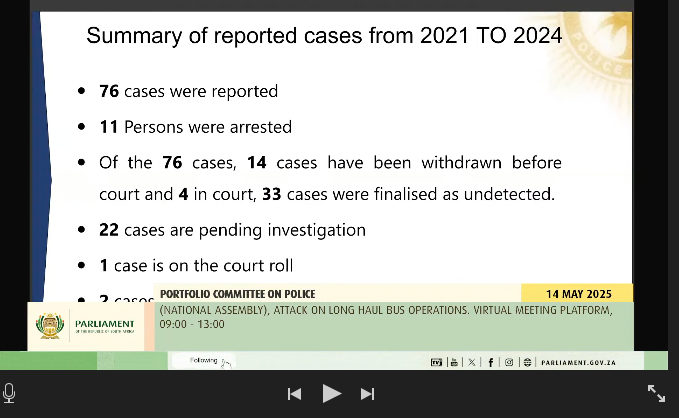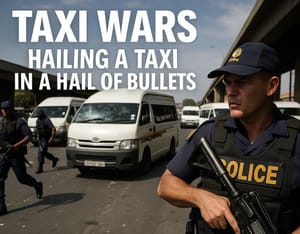What do you do if your police force refuses to investigate certain kinds of crime? Essentially, in a constitutional democracy, a constitutional crisis arises because a key institution of government is failing to uphold its constitutional obligations. There is no clear legal remedy, and the rule of law and/or separation of powers are contradicted.
Because the consequence of the police force refusing to investigate certain kinds of crime is so dire, the police force has moved into a posture of denial. It refuses to acknowledge that it's not investigating certain kinds of crime, while not investigating certain kinds of crime. Or perhaps, it makes some token effort. Or perhaps, in extreme circumstances, some smaller players are in fact arrested. But they are not, in fact, convicted. It's just a governance failure, not a constitutional breach, is the implicit argument.
All of this was dramatically on display last week in the Parliamentary Portfolio Committee on Police, which discussed the issue of attacks on long-distance bus services. It heard evidence from two of the services, Golden Arrow and Intercape, and from a delegation of the SA Police. It was a truly dramatic event, and in good South African style, there were brief news reports, and we all moved on.
But actually, the battle of the long-distance bus operators is very consequential outside of its traumatic history for two reasons. First, because the battle constitutes the interface between one of the most gangster-prone industries in SA - the mini-bus taxi industry - and the rule of law. Second, the phenomenon of the police not investigating certain kinds of crimes manifests not only here, but all over the place: in corruption cases, in cases against certain politicians, and yes, in farm murders.
What was astounding about this hearing was just how shocked and surprised members of the parliamentary committee were about what was going down. This was attributable in part to the powerful presentation by Advocate Kate Hofmeyer, who has been the dynamo behind successive court applications on behalf of Intercape over the past five years.
Intercape Mainliner has been operating for 45 years and has 120 routes across SA; it employs around 1,500 people and carries over three million passengers annually. Along with Greyhound it's the largest of the six or seven long-distance bus operators in SA.
Here is the headline: Intercape have reported one murder charge, 32 shootings, 46 stoning incidents and 118 cases of intimidation to the police over five years - the most recent was last week. So far, not only has nobody been convicted, but nobody has been arrested for any of these cases.
That is bad enough, but what Hofmeyer revealed was precisely the kind of information that was handed over to the police while she argued that this wasn't just a case of random attacks; it's been a coordinated, organised crime by the taxi operators. So, just to spare you listening to five hours of recorded testimony, I have taken a few clips out of the hearing to give you a broad feel for what stunned SA's politicians.
First, this is what it feels like to be shot at if you are a bus driver.
Here is Hofmeyer making her case:
And here is the evidence Intercape handed over to the SAP when the first extortion meeting was held between the long-distance bus operators and the taxi industry: photographs, recording, bank accounts, you name it, all there.
EFF MP Eugene Mthethwa said he was "flabbergasted and disgraced" by what he heard. DA MP Lisa-Mare Schickerling said she was at a loss for words. ACDP MP Kenneth Meshoe called it "heartbreaking and depressing".
What transpired after the taxi industry's apparent attempt at extortion and the failure of the SAP to act is now a matter of public record. Intercape took the SAP to court in the Eastern Cape. The court required the SAP to develop an action plan. They produced a kind of half-arsed effort. Intercape went back to court to ask for a better plan. The court agreed with the requirement. The SAP didn't do it, so the parties went back to court, at which point the court found the SAP in contempt. That case is currently on appeal, with the support of Intercape because it wants a higher court to see if it can get the SAP to take some action.
One interesting aspect of the case is that the SAP argued, in court no less, that the reason why organised crime could not be investigated by the relevant authorities is because Intecape had failed to go into a police station and fill out the right form. "I want to just pause there because it is such a staggering proposition that you almost have to say it twice," said Hofmeyer.
So, how did the SAP respond? Well, SAP Lieutenant General Tebello Mosikili, whose responsibilities include overseeing visible policing and operations, repeatedly complained about a lack of 'resources', suggesting the SAP had no capacity to escort buses, but generally denied that nothing had been done.
She did put up a slide tabulating the reported cases - a number much lower than Intercape had reported, but generally confirmed that, as it happens, up till now, nobody has been convicted.

What about the issue of whether this constitutes "organised crime"? Here, the SAP put into bat the head of the Hawks, Lieutenant General Godfrey Lebeya, whom I think it's fair to say just waved the whole thing off. There was a looooong response (apparently, there was a report done, and a discussion held, and other stuff). Ultimately, it was decided that this case does not constitute organised crime. You can listen to his response here, if you really want to.
One interesting aspect of the hearing was that the other bus company to present to the committee was Golden Arrow, which operates primarily in poor areas in the Western Cape. It's a huge service, contracted in the Western Cape provincial Department of Mobility. It runs about 1,1o0 vehicles on the road every single morning and every night, carrying around 215,000 passengers daily.
Golden Arrow was also attacked by the taxi industry, but the situation has improved dramatically. What it did, interestingly, was sponsor, at their cost, 60 police officers to travel on the buses.
The result, says Derek Malan, general manager for Golden Arrow, was that the police "learned from us in how we operated, but likewise, we could learn from law enforcement what they needed from us in order to work in partnership". The result has been "positive", says Malan. The organisation has put in drop safes, panic buttons, and cameras on the buses. "So if there's an incident, information gets to my operating centre, which is deployed 24 hours, 24x7 for 365 days of the year. And that information is immediately sent to my operations centre who has a direct link with the joint operation centre."
Contrary to the ardent claims of the SAP, the Golden Arrow situation shows that had they wanted to do something about the matters, they could have. The real question is this: Who on earth does not know that SA's taxi operators are mini-mafiosi? That's bad enough for commuters, but the fact that they are not being brought into line simply demonstrates to us all what we already know: if there is no will, there is no way.
From the department of stuff I should really do, but don't...

From the department of unusually useful innovations ...

From the department of when artificial and intelligence don't quite meet .. (pay wall)

Thanks for reading - please do share if you have a friend (or enemy!) you think would value this blog and ask them to add their email in the block below - it's free for the time being. If the sign-up link doesn't appear, you'll find it on the site. Till next time. 💥





Join the conversation